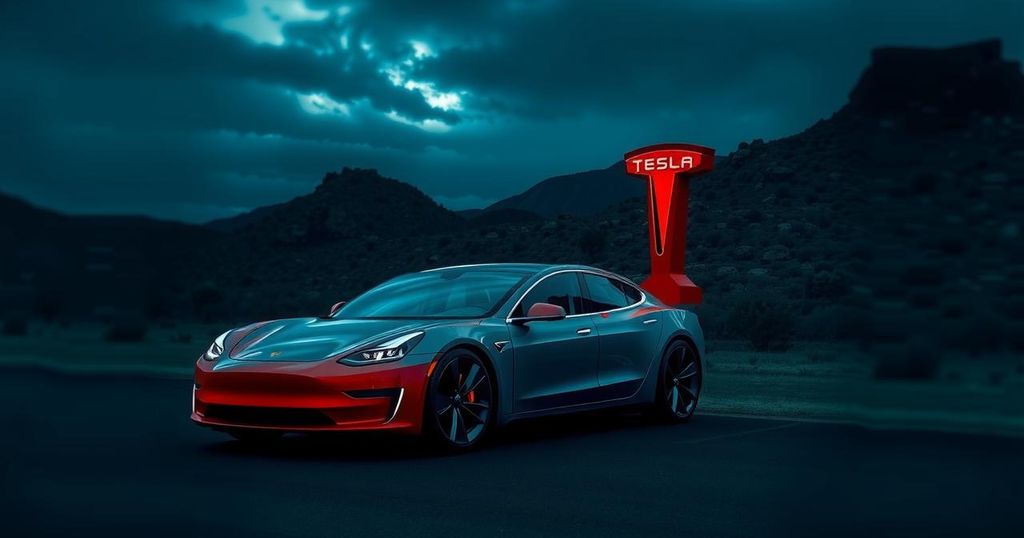Elon Musk accused Jeff Bezos of advising people to sell Tesla stocks ahead of the presidential election, citing a belief that Trump would lose. Bezos denied the claim, while Musk’s investments in Trump’s campaign have garnered attention, influencing Tesla’s stock positively. The rivalry between Musk and Bezos has broader implications in the commercial space sector, with Amazon’s Project Kuiper excluding SpaceX due to their competitive feud. Muss’s relationship with Trump contrasts with Bezos’s neutrality, showcasing divergent approaches within this high-stakes business rivalry.
Elon Musk and Jeff Bezos have yet again engaged in a public dispute following Musk’s assertion that Bezos had privately advised associates to divest their Tesla stocks, anticipating a likely loss for Donald Trump in the presidential election. Musk shared his claims on X, stating, “Just learned tonight at Mar-a-Lago that Jeff Bezos was telling everyone that @realDonaldTrump would lose for sure, so they should sell all their Tesla and SpaceX stock.” Bezos promptly refuted these allegations by stating, “Nope. 100% not true,” to which Musk responded ambiguously, expressing, “Well, then, I stand corrected,” accompanied by a laughing emoji.
The ongoing political machinations surrounding this year’s election have significant implications for the fortunes of Musk’s enterprises. Notably, Musk has invested substantial sums into Trump’s campaign and has cultivated a cooperative relationship with the President-elect, as evidenced by his attendance at Trump’s family gathering on election night. Trump has also shown support for Musk’s ventures, including a visit to a SpaceX launch event in Texas. This support seems to have positively influenced Tesla’s stock price, which saw a remarkable increase following Trump’s electoral victory. As the election results unfolded, Tesla’s shares surged approximately 40%, and have risen by 53% throughout the month. Musk himself acknowledged the critical nature of this election outcome to his fortune.
Contrastingly, Bezos has opted for neutrality amidst the electoral process, refraining from endorsing any candidates and emphasizing that presidential endorsements do not significantly impact electoral results. Bezos has stated, “Presidential endorsements do nothing to tip the scales of an election. What presidential endorsements actually do is create a perception of bias.” This division between Musk and Bezos aligns with their historical rivalry, particularly in the context of space exploration initiatives.
Their longstanding competition was highlighted when Amazon secured substantial contracts for its satellite project, Project Kuiper, notably excluding Musk’s SpaceX as a launch provider. Amazon’s decision to exclude SpaceX has been attributed to the personal rivalry between Musk and Bezos, with allegations that the competitive sentiments influenced procurement processes. Musk has further chastised Bezos for his legal pursuits aimed at challenging SpaceX, suggesting that his rival is more focused on litigation than innovation.
The ongoing rivalry between Elon Musk, the CEO of Tesla and SpaceX, and Jeff Bezos, the founder of Amazon and Blue Origin, has been a notable saga in the business world. The stakes amplified significantly with the recent U.S. presidential election, where Musk’s investments and endorsements of Donald Trump juxtaposed with Bezos’s neutral stance shed light on the interplay between business ventures and political affiliations. Investors and stakeholders in these companies closely monitor these interactions due to their potential ramifications on stock values and industry competition, particularly in the rapidly evolving sectors of electric vehicles and space exploration. This conflict not only showcases personal vendettas but also highlights how business leaders navigate their relationships with political figures and the resultant implications for their companies. The rivalry has led to potential repercussions for their respective leads in the commercial space industry, drawing significant attention from shareholders and market analysts alike.
In conclusion, the exchange between Elon Musk and Jeff Bezos highlights the intertwined nature of business and politics, marked by rivalry and the influence of political endorsements on corporate fortunes. Musk’s claims about Bezos and the subsequent denial reflect the ongoing tensions between these business titans. Furthermore, the outcome of the presidential election has profound implications not only for Musk’s businesses but also for the broader electric vehicle and space sectors. As Musk continues to align closely with Trump, Bezos remains steadfastly neutral, illustrating divergent strategies that may shape the future dynamics of their rivalry.
Original Source: fortune.com






